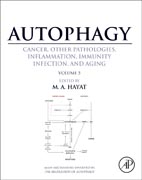
Autophagy: Cancer, Other Pathologies, Inflammation, Immunity, Infection, and Aging
Hayat, M. A.
Understanding the importance and necessity of the role of autophagy in health and disease is vital for the studies of cancer, aging, neurodegeneration, immunology, and infectious diseases. Comprehensive and forward thinking, these books offer a valuable guide to both cellular processes while inciting researchers to explore their potentially important connections. Considering that autophagy is associated with numerous biological processes, including cellular development and differentiation, cancer (both antitumor and protumor functions), immunity, infectious diseases, inflammation, maintenance of homeostasis, response to cellular stress, and degenerative diseases such as Alzheimer's, Parkinson's, Huntington's, amyotrophic lateral sclerosis, and prion diseases, there is a great need to understanding its role. Cell homeostasis is achieved by balancing biosynthesis and cellular turnover. In spite of the increasing importance of autophagy in various pathophysiological situations (conditions) mentioned above, this process remains underestimated and overlooked. As a consequence, its role in the initiation, stability, maintenance, and progression of these and other diseases (e.g., autoimmune disease) remains poorly understood. Presents the most advanced information regarding the role of the autophagic system in life and death and whether autophagy acts fundamentally as a cell survivor or cell death pathway or bothIntroduces new, more effective therapeutic strategies in the development of targeted drugs and programmed cell death, providing information that will aid on preventing detrimental inflammationStates recent advancements in the molecular mechanisms underlying a large number of genetic and epigenetic diseases and abnormalities INDICE: I. General Applications Chapter 1. Introduction; M. A. Hayat II. Role of Autophagy in Cancer Chapter 2. Molecular Crosstalk between the Autophagy and Apoptotic Networks in Cancer; James Driscoll Chapter 3. Inhibition of ERBB Receptors and Autophagy in Cancer Therapy; Ronit Pinkas-Kramarski Chapter 4. Ginsenoside F2 Initiates an Autophagic Progression in Breast Cancer Stem Cells; Somi Kim Cho Chapter 5. Role of Autophagy in Cancer Therapy; Ricardo Gargini Chapter 6. Autophagy in Human Brain Cancer. Therapeutic Implications; Clelia Miracco Chapter 7. Blockage of Lysosomal Degradation is Detrimental to Cancer Cells' Survival: Role of Autophagy Activation; Jessica L. Schwartz-Roberts Chapter 8. Induction of Protective Autophagy in Cancer cells by an NAE Inhibitor MLN4924; Yi Sun Chapter 9. Effect of Autophagy on Chemotherapy-induced Apoptosis and Growth Inhibition; Shanshan Zhang Chapter 10. Autophagy Upregulation Reduces Doxorubicin-induced Cardiotoxicity; Balindiwe J.N. Sishi III. Role of Autophagy in Cardiovascular, Metabolic, and Neurodegenerative Diseases Chapter 11. Autophagy in Critical Illness; Rajesh K. Aneja Chapter 12. Autophagy in the Onset of Atrial Fibrillation; Rodrigo Troncoso Chapter 13. Role of Autophagy in Atherogenesis; Peggy Robinet Chapter 14. Regulation of Autophagy in Insulin Resistance and Type 2 Diabetes; Monika Cahova Chapter 15. Pancreatic Beta Cell Autophagy and Islet Transplantation; Subbiah Pugazhenthi Chapter 16. Autophagy Guards against Immunosuppression and Renal Ischemia-Reperfusion Injury in Renal Transplantation; Yoshitaka Isaka Chapter 17. When the Good Turns Bad: Challenges in the Targeting of Autophagy in Neurodegenerative Diseases; Melissa Nassif Chapter 18. The a-Tubulin Deacetylase HDAC6 in Aggresome formation and autophagy: Implications for neurodegeneration; Christiane Richter-Landsberg
- ISBN: 978-0-12-801033-4
- Editorial: Academic Press
- Encuadernacion: Cartoné
- Páginas: 360
- Fecha Publicación: 15/12/2014
- Nº Volúmenes: 1
- Idioma: Inglés
